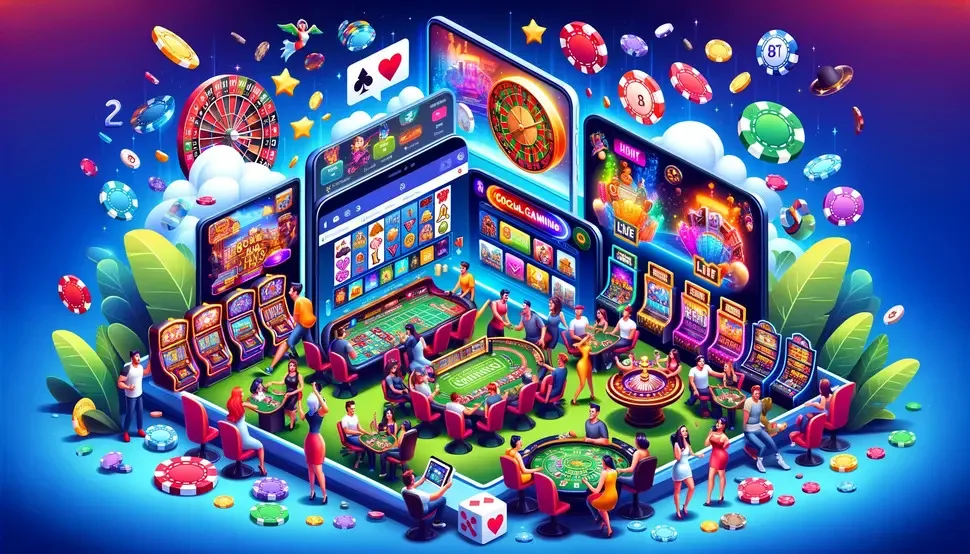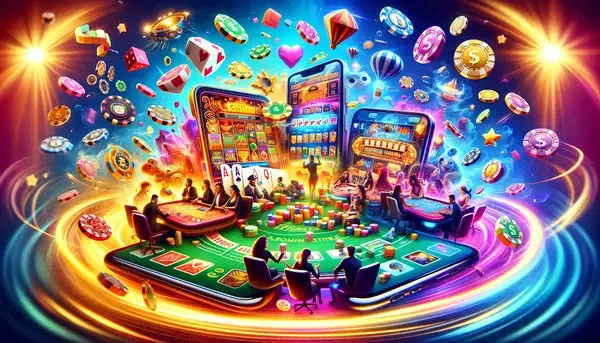The Allure of Social Casino Games: A Modern Twist on Gambling
In the digital age, the line between gaming and gambling continues to blur, giving rise to the phenomenon of social casino games. These platforms offer the thrill of traditional gambling without the risk, integrating the social aspects of gaming with casino-style play. This article delves into the burgeoning world of social casino games, exploring how they differ from conventional gambling, their market dynamics, and the unique ways they generate revenue.
New Way to Win Money
Social casino games represent a new frontier in online entertainment, allowing players to experience the excitement of slots, poker, blackjack, and more, without wagering real money. Instead, players bet using virtual currency, which can be earned through gameplay or purchased with real money. This approach has opened up casino-style gaming to a broader audience, providing a fun and risk-free way to engage with gambling themes.
The Difference Between Gambling and Social Games
The key distinction between traditional gambling and social casino games lies in the stakes: real versus virtual. While online casinos involve betting real money with the potential for financial loss or gain, social casino games operate on a “play for fun” basis. Players can enjoy the mechanics and aesthetics of gambling without the financial implications. For those interested in exploring traditional online gambling, there are sites that offer detailed casino reviews to help navigate the vast landscape of online gambling options https://betacular.net/.
Social Casino Market
The social casino market has experienced explosive growth, driven by the accessibility of smartphones and the widespread use of social media platforms. This sector appeals to a diverse demographic, from seasoned gamblers looking for leisurely play to casual gamers drawn to the casino genre’s excitement and social interaction.
Top Five Industry Leaders
- Zynga Poker: A pioneer in social gaming, Zynga Poker combines competitive card play with social features, allowing friends to challenge each other online.
- Slotomania: Focused on slots, Slotomania offers a wide variety of themed machines and rich graphics, making it a favorite among slot enthusiasts.
- Big Fish Casino: Offering a broad range of casino games, Big Fish Casino emphasizes community play, with options for multiplayer tournaments and social interactions.
- DoubleDown Casino: Known for its extensive slots collection, DoubleDown also provides table games like blackjack and roulette, catering to diverse interests.
- Playtika: A leading company in the social casino industry, Playtika develops several popular casino game apps, including Caesars Slots and WSOP – Texas Holdem Poker.

Where Does the Money Come From?
While social casino games are free to play, they generate revenue through in-app purchases. Players can buy virtual currency, special items, or power-ups to enhance their gaming experience or gain a competitive edge. This model proves lucrative, as dedicated players are willing to spend money for entertainment value and social prestige within these games.
How Else Do the Creators of Social Gambling Games Make Money?
Beyond in-app purchases, social casino game developers monetize through advertising. Given the substantial user base, these platforms are attractive to advertisers looking to reach a broad and engaged audience. Some games also offer branded content, partnering with real-world casinos or entertainment properties to cross-promote products and services.
Social Gambling Statistics
The social gambling industry has seen remarkable statistics, with millions of active players worldwide and revenue in the billions. This sector’s growth reflects the increasing acceptance and integration of casino-style gaming into mainstream culture, promising continued expansion as technology and player preferences evolve.
Problems of Social Casinos
Despite their popularity, social casino games face criticism. Concerns include the potential to normalize gambling behavior among minors, the lack of age restrictions, and the psychological impact of in-game purchases. Additionally, there’s debate over the regulation of these platforms, as the blurred lines between gaming and gambling present new challenges for policymakers.
Conclusion
Social casino games have carved a niche within the online entertainment landscape, offering a blend of gaming and gambling that appeals to a wide audience. While they provide a safe and social way to engage with gambling themes, their success also underscores the need for responsible consumption and clearer regulation. As the market continues to evolve, the future of social casino gaming will likely hinge on balancing player enjoyment with ethical considerations and societal impacts.



